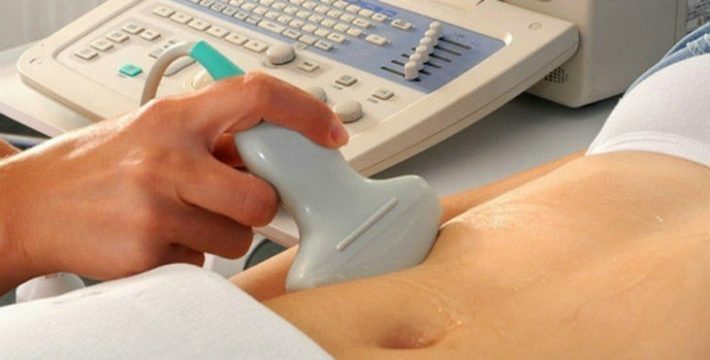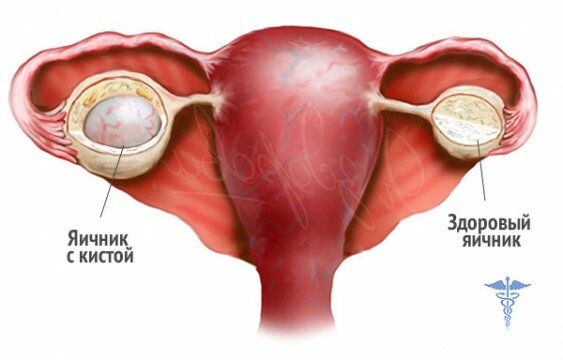Malfunction of the menstrual cycle is quite common, if there is a cystic disease. Delay of menstruation with an ovarian cyst is caused primarily by excessive production of hormones. Many women, from those who faced such a disease, already know that in most cases the cyst resolves itself and recovers the cycle after 2 to 3 months. But this is not an axiom, because in itself the disease has different forms and causes, as well as the accompanying symptoms.

The most common question is, how many days can menstruation last for a cyst? It is worth noting that the delay of the menstrual period longer than 5 days is already an occasion to consult a gynecologist. The cyst can disrupt the menstrual cycle for a period of 5 to 25 days, in some cases the period increases to 2 - 3 months. If the presence of a cyst is established by a specialist, then a recommendation should be followed. As a rule, the doctor recommends postponement with treatment and monitors the development of the neoplasm.
What is the ovarian cyst and how is it formed?
Cystic disease is a benign tumor that is formed due to the influence of various factors. It can be located outside or inside the ovary and is a sac filled with fluid. It is not always a serious disease, although it is necessary to follow it.
If the formation is caused by a violation of the internal organs, or more precisely - a malfunction in the ovaries, then this cyst is called "functional", because its appearance is caused by unstable functioning. Such a cyst can influence the regularity of the menstrual cycle.
- Follicular cyst. During the menstrual cycle, the follicle is formed on the ovary, in which the ovules develop. During ovulation the egg leaves it, which is often accompanied by inessential pain sensations. But if the shell does not break through, the egg can not come out and fluid accumulates in the follicle. The delay in menstruation is caused by a violation of the hormonal cycle and can last from 5 to 3 weeks.
- Luteal cyst( yellow body cyst).This type of education can contain blood. When the oocyte leaves the follicle, the neoplasm stimulates the production of the hormone "progesterone", which is the reason for the delay.
Cystic disease, as a rule, is characterized by the presence of various concomitant symptoms. So, with follicular formation, the duration of menstruation( up to 7 days), as well as regular delays, is observed. Bleeding in this disease is plentiful and accompanied by pain in the ovaries.
In the presence of luteal cysts, the symptoms differ slightly:
- Pain in the mammary gland;
- Drawing pain in the lower abdomen;
- Nausea;
- Various signs of false pregnancy.
There are other forms of the disease, in which there are no symptoms, that the number of menstruation is not delayed, and the cycle is not disturbed:
- Dermoid;
- A paraovarian cyst is formed from the appendages that are above the organ. This form of the disease is observed in patients aged 20 to 40 years, the tumor is oval and covered with a grid of small vessels. Ovaries are not involved in pathology.
- Endometrioids are usually characterized by the presence of foci.
- Mucous cyst can grow to large sizes or go into a malignant tumor.
With this form of cystic disease, a delay of the cycle is possible, but in this way the cyst is quite rare.
Diagnosis and treatment of
Often delay in menstruation is the only signal for the development of cysts on the ovaries. It is impossible to establish the presence of this disease only by symptoms, an ultrasound examination is necessary. The gynecologist determines the nature of the appearance of the neoplasm, prescribes the direction for the tests, and also prescribes the necessary treatment.

Neoplasm caused by dysfunction should be monitored regularly. Most often the cyst resolves and disappears naturally. When the disease causes severe delay in menstruation or is accompanied by various painful sensations and symptoms prescribed medication. The specialist prescribes hormonal preparations, applied according to the individual scheme. In difficult cases, the cyst is removed surgically, after which the patient needs a small recovery course.
Regardless of the type of cystic disease and the causes of its appearance, it is important to immediately contact a women's consultation. It is likely that the cyst will disappear without a trace, but there are serious problems when the tumor is scrolled, negatively affects the circulation. To avoid the development of concomitant diseases or deterioration of well-being, it is highly discouraged to resort to self-medication.
Positive pregnancy test
In order not to create misunderstanding and misconceptions, for which reasons the pregnancy test shows a positive result, it is important to know all the reasons for this phenomenon. It does not always mean a fact of pregnancy, because in some situations a woman can be sure of not having a pregnancy, and the test shows the opposite.
So, what are the reasons:
- Incorrect use of the pregnancy test. Use at least 3 tests with a slight difference in time - whether day or two.
- Unsuitable test, indicating expiration date, deformed packaging, violation of storage rules.
- Testing after a short period of time after having intercourse can also show a positive result.
- The use of various contraceptive pills or medications.
- An unstable menstrual cycle rarely shows the correct result, if malfunctions are observed regularly, then the use of the test is meaningless.
- Pathology or dysfunction of the ovaries.
- In ectopic pregnancy testing also indicates pregnancy, but does not establish the fact of pathology.
Can a cystic lesion be misleading and indicate a false positive result? It can be concluded that the presence of an ovarian cyst does not affect the result of testing for pregnancy, but it may be associated with this, for example, when the cystic disease is of a functional nature along with a serious pathology of the ovaries.
Causes of a delay in the monthly
The menstrual cycle is a periodic process of the reproductive function of the female body. The normal cycle time varies from 21 to 35 days, depending on the individual characteristics. The average period is considered to be 28 days, and the count begins on the first day of the month.
But more important is the regularity. The first 1 - 2 years periodicity can be violated, it is considered normal. The girl's hormonal balance is just beginning to be established. In a more mature, or even "experienced" age, the delay in menstruation is unfavorable.
It is worthwhile to consider the various causes of menstruation delay in order to fully understand whether this is a symptom of cyst formation or is caused by other factors:
- Ovarian dysfunction is not a specific disease, it is a fact of the irregularity of the menstrual cycle. But what is specifically caused by the unstable operation of the ovaries, the specialist will find out after examination and diagnosis.
- Overexertion, stress or neurosis gives the brain a signal that the environment for the birth of offspring is unfavorable, and therefore the body responds, which is manifested in the instability of the menstrual period. Here, a simple and affordable solution will be a full-fledged dream, rest. And, if necessary, a visit to a psychologist.
- Physical loads can energize and improve the body, but with excessive physical work, including increased training, specific work, the menstrual cycle may be disrupted. But it is worthwhile to understand that it is a question of excess of physical exertion, and not about fitness or morning jogs.
- Acclimatization often becomes a stress for the body. Sharp climate change, excessive sun exposure, abuse of the solarium - all this can delay the monthly. It is important to monitor the body and remember that everything is good in moderation.
- Overweight. Subcutaneous fat accumulates not only slag, but also female hormones, which leads to hormonal imbalance. Naturally, this leads to a delay.
- Intoxication of the body - this can occur with the abuse of tobacco, alcohol, drugs, as well as taking medications or working in chemical plants.
- Heredity rarely affects the regularity of the cycle, but similar facts have been established. Whether such a fact could influence or not will be prompted by close relatives: mother, grandmother or sister.
- Gynecological diseases. It is important to understand that it is possible to establish exactly what disease causes a cycle failure only with personal consultation. As general information, we can distinguish such diseases as tumor diseases, inflammatory processes, infectious diseases, improperly installed spiral.
There are other, more rare causes that are expressed with the instability of the menstrual cycle, only the most common are listed above.



